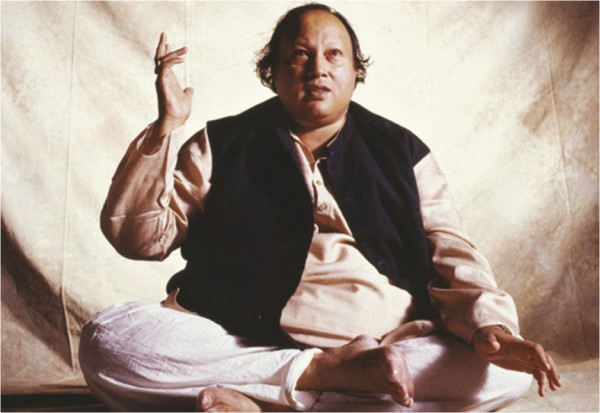| Post Campus

Nusrat Fateh Ali Khan:
A
Magician
Musician
Asrar Chowdhury
Photos: Internet
Something touched me deep inside the day Nusrat Fateh Ali Khan died on August 16, 1997, fifteen years ago. I have never fully understood the language, but the majesty and power in his graceful voice was always enough to transcend boundaries to reach the common goal of all devotional music- the search for one's inner soul through and with music. South Asia lost one of its most influential voices.
Music has been a central feature of South Asia that boasts one of the oldest surviving music traditions with origins from and before the Aryan invasions of North India 4,000 years ago. With the arrival of Muslims in the second millennium, South Asian music slowly began to evolve into what is known today as Indian Classical Music. Hazrat Amir Khusru from the 13th Century was instrumental in laying the formal foundations of Hindustani Classical Music on one front and introducing Sufism from Persia and Central and Western Asia through music in the form of Qawwali on another front. It was in this ancient tradition that Nusrat Fateh Ali Khan was born in Lyallpur (Faisalabad) in 1948. His ancestors emigrated from Ghazni in Afghanistan and settled in Punjab 600 years ago. From then on, the family has been servants of Qawwali music for generations.
Unlike European Classical music, Indian Classical music is based on a well structured oral tradition. This oral tradition allows the scope for improvisation, but keeping true to its original Ragas and Thats (Scales). Nusrat Fateh Ali Khan's Qawwali Gharana is one of the few of its kind that has based its devotional music on Dhrupad and Khayal for almost 600 years. This time tested fusion with its Indian Classical roots has always made Qawwali music having the potential to attract and appeal beyond the boundaries of its Sufi roots. Sufi music, like any other devotional music, has a universal appeal- to search for one's God and Soul through and with music. It is therefore no surprise that Qawwali music did not take much time to appeal to a global audience outside South Asia.

Nusrat Fateh Ali Khan, the legendary Qawwal.
Legend has it, Nusrat had a recurring dream. He was singing at the Dargah of Hazrat Khaja Mainuddin Chishti of Ajmeer- one of the greatest Sufi Saints of South Asia. This recurring dream made young Nusrat want to become a Qawwal. Following the death of his Father, Fateh Ali Khan in 1964, Nusrat received tutelage from his uncle, Mubarak Ali Khan. After the death of his uncle in 1971, Nusrat became the leader of the Qawwali Party. From 1971 to 1997 until his death, Nusrat remained the undisputed King of Qawwali music and its greatest ambassador to a global audience.
By the mid 1970s, Nusrat and Party had established their supremacy all over Pakistan. Although the Sabri Brothers were the first to introduce Qawwali music to a global audience in the early 1970s, they were performing to expatriate audiences. By the beginning of the 1980s, Nusrat launched an unmatched introduction of Sufi music to a global audience.
When performing to a foreign audience that does not understand the language of the lyrics, it is the musician's challenge to be able to present music as a “universal language of the world” as Nusrat himself once said in an interview because melody and tempo knows no boundaries. Melody and tempo is composed of the 12 universal notes of an octave (saptak) and can thus transcend all cultural boundaries. His training in Hindustani Classical music, and above all a magnificent power and grace of a control of all six octaves of the piano keyboard gave Nusrat an unprecedented edge over any vocalist of his time. He could sing hour after hour and yet the notes would not falter and the tempo would remain water-tight. Add the Sufi devotion to all this and the listener would get nothing but magic.
Nusrat's association with Peter Gabriel (Last Temptation of Christ); Eddie Vedder (Dead Man Walking); and Michael Brook (Mustt Mustt, and Night Song) introduced Sufi devotional music to the West. Even Bollywood did not miss out the opportunity of being kissed by Sufism. Years after his death AR Rehman paid a tribute to the “Guru of Peace” through the two songs Allah Hoo, and Tere Bina.
In a time when civilisation is at a crossroad, musicians like Nusrat Fateh Ali Khan who can rise above religion, creed, caste and nationality to make diversity disappear are needed more than ever. What the West experienced in Love and Peace at Woodstock, 1969 that introduced the West to Buddhism, Rumi through Sufism and the chants of Hare Krishna, South Asia has been enjoying this common heritage for millennia. Nusrat Fateh Ali Khan has been and will remain one of its greatest exponents that music rises above all to attain love and peace. Something does touch your heart when you think Nusrat- the magician musician- died fifteen years ago!
(The author teaches economic theory at Jahangirnagar University and North South University.)
| 